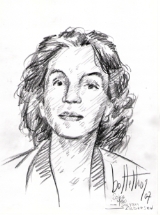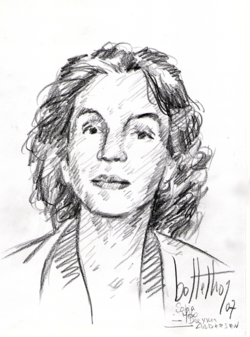
Sophia de Mello Breyner Andresen
Encyclopedia

Portugal
Portugal , officially the Portuguese Republic is a country situated in southwestern Europe on the Iberian Peninsula. Portugal is the westernmost country of Europe, and is bordered by the Atlantic Ocean to the West and South and by Spain to the North and East. The Atlantic archipelagos of the...
poet
Poet
A poet is a person who writes poetry. A poet's work can be literal, meaning that his work is derived from a specific event, or metaphorical, meaning that his work can take on many meanings and forms. Poets have existed since antiquity, in nearly all languages, and have produced works that vary...
and writer
Writer
A writer is a person who produces literature, such as novels, short stories, plays, screenplays, poetry, or other literary art. Skilled writers are able to use language to portray ideas and images....
.
Sophia, as she is often referred to in Portugal, was born in Porto
Porto
Porto , also known as Oporto in English, is the second largest city in Portugal and one of the major urban areas in the Iberian Peninsula. Its administrative limits include a population of 237,559 inhabitants distributed within 15 civil parishes...
to a wealthy aristocratic family. She inherited the surname 'Andresen' from her paternal grandfather, a Danish merchant. She received a strict Catholic upbringing, and was to remain a fervent believer until the end of her life. After spending her childhood in Porto she moved to Lisbon
Lisbon
Lisbon is the capital city and largest city of Portugal with a population of 545,245 within its administrative limits on a land area of . The urban area of Lisbon extends beyond the administrative city limits with a population of 3 million on an area of , making it the 9th most populous urban...
, where she attended the Universidade de Lisboa. As a student, she was activelly involved in Catholic movements. Politically, she defended constitutional monarchy and openly criticized Salazar
Salazar
- Angola :* Vila Salazar, Portuguese colonial name for the city of N'dalatando in the province of Cuanza Norte- Spain :* Salazar , a village in the municipality of Villarcayo de Merindad de Castilla la Vieja, province of Burgos, in the autonomous community of Castile and León* Salazar Valley, in...
's dictatorship. In 1946 she married lawyer and politician Francisco Sousa Tavares. They had five children, among whom journalist and best-selling author Miguel Sousa Tavares
Miguel Sousa Tavares
Miguel Andresen de Sousa Tavares is a Portuguese lawyer, journalist and writer.The son of poet Sophia de Mello Breyner Andresen and lawyer and politician Francisco Sousa Tavares, Miguel received his education in Law, eventually pursuing careers in journalism and essay writing for which he became...
. After the Carnation Revolution
Carnation Revolution
The Carnation Revolution , also referred to as the 25 de Abril , was a military coup started on 25 April 1974, in Lisbon, Portugal, coupled with an unanticipated and extensive campaign of civil resistance...
in 1974, she made a brief incursion into politics as an MP for the Socialist Party (centre-left).
Andresen won acclaim as a storyteller with Contos Exemplares (Exemplary Tales),"Histórias da Terra e do Mar" (Stories of Land and Sea), and a number of children's books - A Menina do Mar (The Sea Girl), O Cavaleiro da Dinamarca (The Danish Knight), A Floresta (The Forest), O Rapaz de Bronze (The Bronze Boy), A Fada Oriana
A Fada Oriana
A Fada Oriana , Portuguese for The Fairy Oriana, is one of the most emblematic children's book of Portuguese literature, written in 1958 by Sophia de Mello Breyner Andresen....
(The Fairy Oriana). She also published several poetry books and anthologies, including: Poesia, Dual, Livro Sexto, Coral, Dia do Mar, No Tempo Dividido, Grades, O Nome das Coisas, As Ilhas, Antologia, Geografia, Navegações, O Búzio de Cós. In 1999 she became the first woman to receive the highest Portuguese award for poetry, the Prémio Camões. She was also awarded the Spanish Premio Reina Sofia in 2003.
"Poetry," she explained, "is my understanding of the universe, my way of relating to things, my participation in reality, my encounter with voices and images. This is why the poem speaks not of an ideal life but of a concrete one: the angle of a window, the resonance of streets, cities and rooms, the shadow cast by a wall, a sudden face, the silence, distance and brightness of the stars, the night’s breath, the scent of linden and of oregano." The sea is probably the most central theme in her poetical works. Other recurring themes are Ancient Greece and ideas of freedom and justice.
Besides her work as a writer, she translated Dante and Shakespeare into Portuguese.
Sophia de Mello Breyner Andresen died in Lisbon on July 2, 2004, aged 84.
Her poetry has been translated into English by Richard Zenith.
Awards
- In 1964 Grand Prize for Poetry by the Portuguese Writers Society for her book Livro Sexto (The Sixth Book).
- In 1977 Teixeira de Pascoaes Prize for her book O Nome das Coisas (The Name of Things).
- In 1983 Critics' Prize by the International Association of Critics for the full set of her work.
- In 1989 King Diniz Prize by the Casa de Mateus Foundation for her book Ilhas (Islands).
- In 1990 Grand Prize for Poetry by both Inasset/Inapa and Pen Club for her book Ilhas (Islands).
- In 1992 Calouste GulbenkianCalouste GulbenkianCalouste Sarkis Gulbenkian was an Armenian businessman and philanthropist. He played a major role in making the petroleum reserves of the Middle East available to Western development...
's Grand Prize for Literature for Children by the Calouste Gulbenkian FoundationCalouste GulbenkianCalouste Sarkis Gulbenkian was an Armenian businessman and philanthropist. He played a major role in making the petroleum reserves of the Middle East available to Western development...
for the full set of her work. - In 1994 "Vida Literária" (Literary Life) Prize by the Portuguese Association of Writers.
- In 1995 Honour Plaque of the PetrarcaPetrarchFrancesco Petrarca , known in English as Petrarch, was an Italian scholar, poet and one of the earliest humanists. Petrarch is often called the "Father of Humanism"...
Prize by the Italian Association of Editors. - In 1998 Luís Miguel Nava Foundation Prize for her book O Búzio de Cós e Outros Poemas.
- In 1999 the Camoens Prize for Portuguese language literaturePortuguese language literaturePortuguese language literature can be:* Literature of Angola* Literature of Brazil* Portuguese literature...
. - In 2003 the Reina Sofia Prize for writers of Portugal, Spain and Latin America.

